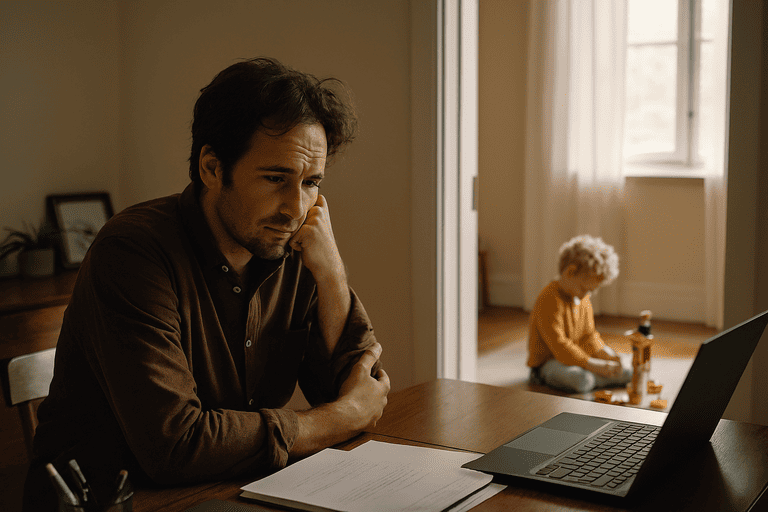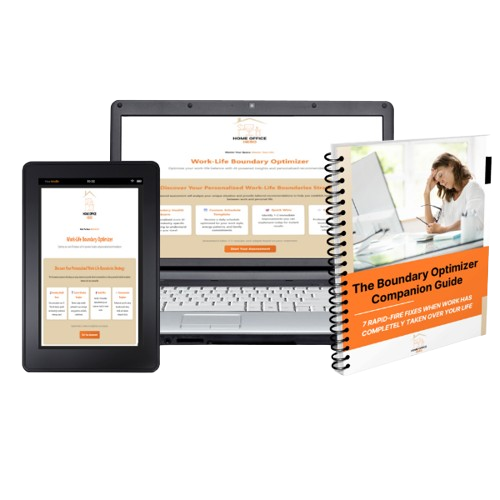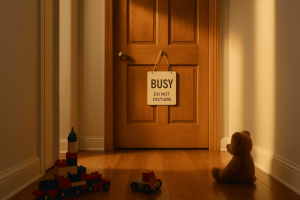The text message came through at 1:15 PM on a Wednesday afternoon.
From Hayley: “Shaw just won his sprint race! He was looking everywhere for you in the crowd. Asked where you were. I told him you had to work. He said ‘okay’ but his face dropped. Thought you’d want to know.”
My stomach dropped.
I’d missed it. His sports day. The annual primary school event he’d been talking about for weeks. I’d promised I’d be there. But that morning, a client called with an “urgent” website crisis that “absolutely needed” to be fixed before their afternoon board meeting. I’d made the calculation: disappoint the client or miss a couple hours at the school field.
I chose work. And now, sitting in my home office staring at my laptop, that decision felt like the worst one I’d ever made.
I’d fixed the website issue. The client was thrilled. My invoice would get paid. But Shaw had looked for me in the crowd, and I wasn’t there. This is part of our complete guide on Work-Life Balance for Remote Working Parents, where we address not just schedules and boundaries, but the emotional weight that comes with working from home.
If you’ve ever felt crushing guilt about choosing work over your kids—or felt guilty about enjoying your work when you “should” want to be with your kids—this post will help you understand where that guilt comes from and, more importantly, how to release it.
The Problem: Why Work From Home Parent Guilt Feels Different
Here’s what makes work from home parent guilt uniquely painful: you’re making these micro-decisions between work and parenting dozens of times every single day.
Office workers leave home, work for eight hours, then return. The separation creates natural boundaries. But when you work from home? You’re choosing work over family—and family over work—constantly. Every email you answer during breakfast is a choice. Every time you close your office door while your child asks to play is a choice. Every school event you skip for a deadline is a choice.
And each choice feels like evidence that you’re failing at both.
After six years of running my digital marketing agency from home while raising Shaw, I’ve identified the three guilt triggers that hit remote working parents hardest:
Guilt Trigger 1: The Visibility Trap
Your kids see you at home. They know you’re just in the other room. So when you say “I’m working and can’t come,” they don’t understand why you’re unavailable when you’re literally right there. This creates guilt you wouldn’t feel in an office—the guilt of visible rejection.
Guilt Trigger 2: The Flexibility Paradox
You chose remote work for flexibility. So every time you enforce a work boundary, a voice whispers: “Isn’t flexibility the whole point? Other parents would kill for this schedule. Why are you still saying no?” The freedom that was supposed to reduce guilt actually amplifies it.
Guilt Trigger 3: The Comparison Spiral
Social media shows stay-at-home parents who seem fully present with their kids. It shows corporate parents with clear work-life separation. But working from home? You’re doing both badly, or so it feels. You’re not the present parent OR the successful professional. You’re constantly falling short of both ideals.
I spent two years believing I was the only parent who felt this torn. Then I started talking to other remote working parents. Every single one carried the same weight. The guilt isn’t your failure—it’s the inevitable result of a situation where parenting guilt working from home becomes magnified by constant proximity and choice.

Where Parent Guilt Really Comes From
Before you can release guilt, you need to understand its source. Working parent guilt isn’t random—it comes from three specific misalignments:
Misalignment 1: Expectations vs. Reality
You expected remote work to give you the best of both worlds: career success AND present parenting. Instead, you got career guilt AND parenting guilt simultaneously. The expectation that you should excel at both creates perpetual disappointment.
Misalignment 2: Identity Conflict
You’re not just a parent. You’re not just a professional. You’re both. But our culture still treats these as competing identities. “Good parents” supposedly prioritise children above all else. “Serious professionals” supposedly prioritise work above all else. You’re trying to be both, which means you’re always betraying one identity for the other.
Misalignment 3: The Myth of Balance
We’re told to “balance” work and parenting as if they’re equal weights on a scale. But some weeks, work demands more. Some weeks, kids need more. Overcoming parent guilt starts with accepting that balance is a myth—what you’re actually doing is constantly choosing where to direct your energy based on what’s most urgent.
That Wednesday when I missed Shaw’s sports day? I was measuring myself against an impossible standard: the parent who never misses anything AND the professional who never disappoints clients. That standard doesn’t exist. The guilt came from believing it should.
Reframing: Four Mindset Shifts That Change Everything
Releasing guilt requires more than positive thinking—it requires fundamentally reframing how you view work, parenting, and yourself.
Reframe 1: From “Either/Or” to “Both/And”
Old Story: I’m either a good parent or a good professional. Every choice proves which one I’m failing at.
New Story: I’m both a dedicated parent and a committed professional. Some decisions prioritise work. Some prioritise family. Neither choice makes me a failure at the other role.
When I reframed my decision about Shaw’s sports day, it shifted from “I chose work over my son” to “I made a difficult decision to meet a client commitment, AND I’m a devoted father who will make different choices when I can.”
Reframe 2: From “Quality Time” to “Real Relationship”
Old Story: If I’m not giving my kids focused, uninterrupted, high-quality time, I’m a bad parent.
New Story: Relationship happens in all moments—including the messy, interrupted, imperfect ones. My kids learn resilience, work ethic, and adaptability by seeing me navigate real challenges.
Shaw has seen me work hard, handle stress, solve problems, and recover from setbacks. Those aren’t parenting failures—they’re life lessons I couldn’t teach any other way. Understanding work-life integration as a better approach than balance means accepting that kids benefit from seeing our whole lives, not just our perfect parenting moments.
Reframe 3: From “Present vs. Absent” to “Different Kinds of Presence”
Old Story: I’m either fully present with my kids or I’m absent and failing them.
New Story: There are different kinds of valuable presence. Sometimes I’m actively engaged. Sometimes I’m nearby while working. Sometimes I’m physically away but thinking of them. All of these have value.
The afternoon of Shaw’s missed sports day, I felt like the worst father in the world. But when I picked him up from school, he ran to tell me about winning his race. He was excited to share it with me, not resentful I’d missed it. My physical absence at one event didn’t erase my consistent presence in his life.
Reframe 4: From “Guilt as Proof” to “Guilt as Information”
Old Story: This guilt proves I’m a bad parent who cares more about work than family.
New Story: This guilt is information about my values and priorities. It shows I deeply care about both work and family—which is why choices feel hard.
Guilt isn’t evidence you’re failing. It’s evidence you care. The fact that you feel guilty about work taking you away from kids means you value your kids. The fact that you feel guilty about not working enough means you value your professional commitments. Both are true. Neither is wrong.
Four Practical Techniques to Release Guilt
Mindset shifts help, but you also need practical tools for moments when guilt hits hard.
Technique 1: The Guilt Journal
When guilt strikes, write down three things:
- What triggered this guilt?
- What am I telling myself about this situation?
- What would I tell a friend in this exact situation?
We’re often far kinder to others than to ourselves. The third question reveals the compassion you’re denying yourself.
After Shaw’s sports day, my journal looked like this:
Trigger: Missing his race when he’d been so excited about it
Story: I’m a terrible father who prioritises money over memories
Friend advice: You made the best decision you could with the information you had. One missed event doesn’t define your relationship. You’ll be at the next one.
That last line became my action plan.
Technique 2: The “Next Time” Protocol
Instead of drowning in guilt about what you did wrong, create a concrete plan for what you’ll do differently next time.
My protocol after missing Shaw’s sports day:
- Add all school events to my calendar immediately when announced, marked as non-negotiable
- Block those times for all clients when scheduling future work
- Create a “client emergency” protocol that defines what actually qualifies as urgent (spoiler: most things don’t)
- Build buffer time into all deadlines so unexpected work doesn’t collide with family commitments
Action dissolves guilt. Every time you feel guilty, ask: “What’s my next-time protocol?”
Technique 3: The Shame vs. Guilt Distinction
Guilt says: “I did something wrong.”
Shame says: “I am something wrong.”
Guilt is useful—it motivates change. Shame is destructive—it paralyses you.
When you catch yourself spiraling, ask: “Am I feeling guilty about a specific action I can change, or am I feeling ashamed of who I am as a parent?”
If it’s shame (“I’m a terrible parent”), you need the reframes from earlier. If it’s guilt (“I missed this specific event”), you need the next-time protocol.
Learning about setting work from home boundaries helps prevent future guilt-inducing situations, but when guilt shows up, distinguishing between shame and guilt is essential.
Technique 4: The Permission Slip
Write yourself a permission slip for what you need to hear. Keep it visible.
Mine says:
- “I have permission to prioritise work sometimes.”
- “I have permission to prioritise family sometimes.”
- “I have permission to make imperfect decisions and still be a good father.”
- “I have permission to enjoy my work without feeling guilty about not being with Shaw.”
That last one is crucial. Many parents feel guilty not just for choosing work, but for enjoying work. You’re allowed to find fulfillment in your professional life. That doesn’t make you a bad parent—it makes you a whole human.

Building Guilt-Resistant Confidence
Releasing guilt isn’t a one-time event—it’s building systems that prevent unnecessary guilt and help you process inevitable guilt quickly.
Build Confidence Through Communication
The biggest guilt reducer? Honest conversations with your kids about work.
I sat Shaw down that evening after missing his sports day: “I made a mistake. I thought that work problem couldn’t wait, but being there to watch you race is more important to me than any client. I won’t miss your next school event. But I need to tell you something: sometimes I will have to work when you’d rather I didn’t. That doesn’t mean work is more important than you. It means I’m teaching you that we honor our commitments—including the ones we make for work that pays our bills and lets us do fun things together.”
He understood better than I expected. Kids aren’t fragile—they’re perceptive. They can handle truth better than they can handle inconsistency.
Build Confidence Through Prioritisation
Create three tiers of commitments:
Tier 1 – Non-Negotiable: School performances, sports days, important medical appointments, major events. Work never interrupts these.
Tier 2 – High Priority: Regular family dinners, bedtime routines, weekend family time. Work can interrupt only for genuine emergencies.
Tier 3 – Flexible: Daily playtime, casual activities. Work can interrupt these, but you make up for it at other times.
Having tiers prevents guilt because you’re not treating every decision as equal. Missing Tier 3 for work? No guilt needed—you’ll play tomorrow. Missing Tier 1? That needs your next-time protocol.
Build Confidence Through Self-Compassion
Research shows self-compassion is more effective than self-criticism for behavior change. Every time you catch yourself in a guilt spiral, practice the self-compassion break:
- Acknowledge: “This is a moment of struggle. I’m feeling guilty.”
- Normalise: “Other remote working parents feel this way too. This is part of the challenge.”
- Kindness: “May I be kind to myself in this moment. May I give myself the compassion I need.”
It feels awkward at first. Do it anyway. Self-compassion isn’t self-indulgence—it’s the foundation of sustainable parenting and professional performance.
Implementation: Your Next Steps
Start with one technique this week. Not all four—just one.
If guilt is frequent and intense: Start with the Guilt Journal (Technique 1). Understanding your patterns is the foundation.
If guilt comes from specific repeated situations: Use the Next-Time Protocol (Technique 2) to create concrete action plans.
If guilt feels overwhelming and paralysing: Practice the Shame vs. Guilt Distinction (Technique 3) to identify when you’re being unfairly harsh with yourself.
What to expect: The first few times you practice these techniques, they’ll feel mechanical and unhelpful. Your brain will resist: “This isn’t working. I’m still a terrible parent.” Keep going. Change happens through repetition, not revelation.
Common mistakes to avoid:
- Expecting guilt to disappear overnight (it won’t—it fades gradually)
- Using these techniques to avoid genuine accountability (some guilt is warranted and motivates positive change)
- Beating yourself up for feeling guilty (guilt about guilt is pointless meta-suffering)
- Comparing your guilt journey to other parents’ Instagram highlight reels
The goal isn’t eliminating all guilt—it’s building resilience so guilt informs your decisions without paralysing you.
Conclusion
Work from home parent guilt isn’t evidence you’re failing. It’s evidence you care deeply about both your professional work and your family. The pain comes from believing you should excel at both simultaneously, perfectly, all the time.
You can’t. Nobody can.
Quick Recap:
- Guilt is amplified for remote parents due to visibility, flexibility paradox, and comparison spirals
- Reframe from “either/or” to “both/and” thinking about work and parenting identities
- Use practical techniques: Guilt Journal, Next-Time Protocol, Shame vs. Guilt distinction, Permission Slips
- Build guilt-resistant confidence through honest communication and tiered priorities
Your next step: Write one Permission Slip for yourself right now. Just one sentence you need to hear. Put it somewhere visible. Read it every morning this week.
As for Shaw’s sports day? I made it to every school event after that. And when I occasionally miss one for genuine work emergencies, I no longer spiral into shame. I acknowledge the disappointment, I follow my protocol, and I show up fully at the next opportunity.
That’s not perfect parenting. It’s human parenting. And it’s enough.
What guilt have you been carrying that you’re ready to release? Drop a comment below—sometimes naming it out loud is the first step to letting it go.
Continue Reading
For more strategies on creating sustainable remote work life, explore these articles:
Work-Life Balance for Remote Working Parents: The Complete 2025 Guide – Our comprehensive pillar covering all aspects of achieving harmony while working from home
Work From Home Boundaries: Setting Limits Without Guilt – Learn to protect your time and energy with clear, guilt-free boundaries
Remote Work Mental Health: Protecting Your Wellbeing While Working From Home – Address the mental health challenges that amplify guilt for remote working parents
Part of the Work-Life Balance & Harmony series. For the complete guide, see our Work-Life Balance for Remote Working Parents pillar post.










